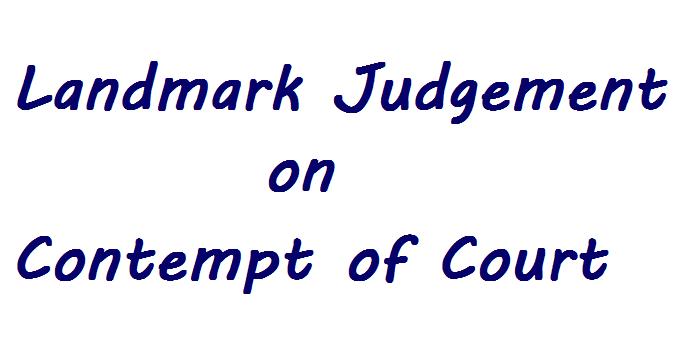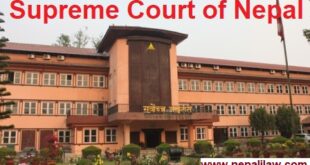Supreme Court of Nepal established a new principle in the case of Khilanath Dhakal vs. Kumar Bhattarai one of the popular cases on contempt of court case.
The joint bench of Justice Anil Kumar Sinha and Justice Hari Prasad Phuyal have trying to define a new concept.
On 28 February 2020 made public the judgment saying that in today’s democratic society, the court does not use contempt proceedings as a weapon to prevent clean and unbiased positive criticism of the court proceedings, judgments, orders, and judges and unpleasant criticism on the basis of comments or facts.
The Khilanath Dhakal, the reporter of the Nagarik Daily newspaper, has reported the case, which is sub-judice in the Appellate court, Biratnagar on 21 December 2011. Dhakal reported with putting the judge’s picture that “Khaman Singh Bohara of Biratnagar-12 suffered physical and mental torture while being held hostage for six hours. Azam Parvez Miya, a party cadre from the same place, abducted him on July 12 after he refused to pay Rs 1 million. Parvez, who was arrested three weeks after the incident, was convicted by the Morang District Court on October 29 and sent to judicial custody. Two months later, on December 3, he was released from the appellate court in Biratnagar on a normal date.”
The applicant urged that Khilanath Dhakal has been knowingly misguided and scandalize upon the judiciary, judge, and judicial process. This news report also makes obstruction in the fair judicial trial. Thus he must be punished under contempt of court.
Defendant Khilanath Dhakal, said in his written statement that I did not commits contempt of court offense, this news is not obstructed the judicial process and not blame the judiciary and judges, I respect the courts. I wanted to distribute the news and information regarding the court’s order and the court’s decision to the general public.
Apex court observed that by making the courts independent, impartial, competent, and effective, safeguarding the faith and trust of the general people towards the judiciary, every democratic country in the world has been given the exclusive right to courts for making prosecution for their contempt.
Previous constitution, 2006 and article 128(4) of prevailing Constitution of Nepal, 2015 stated that if anyone makes an obstacle in the administration of justice, disregard any order or judgment of any court the Court may start procedures and force contempt of court.
However our Constitution does not clearly define “contempt of court”, it expresses that the court may initiate proceedings and execute punishment for the contempt of court.
The joint bench refers the several cases previously decided by the supreme court of Nepal and some cases the Indian Supreme Court and British.
The Court clarified that if the press and media spread misleading rumors about the court through their publications and obstruct the administration of justice or scandalize the court by creating distrust towards the court, such acts are considered as contempt of court. The power of the judiciary is the faith and trust of the people upon it, but when any kind of misleading and false rumor is spread, its publicity is tarnished by publicity, and its judges and staff are defamed. Such an act should be considered not only unprofessional and unresponsive in the field of mass media but also contempt of court. Courts also have to exercise extreme caution and restraint when conducting contempt proceedings or making decisions.
It further stated that in case of gross disrespect of indirect and civil wrong and if such person is not prosecuted, it may affect the judiciary and democracy, in that cases to forgive such person is also in favor of judges and judicial bodies, procedures, courts, and democracy.
It is the duty of the media to sound criticize the court. It is also important to look at the intention factors of such a person. If the journalist wrote news about the court or obstruct the judicial administration with malafide intention knowingly, in this condition court can never be released, such person. In such a situation, the court needs to determine the existence of vilification of criticism or obstruction of public justice, or gross misstatement.
The court concluded that in this case, the defendant apologized several times during the testimony. The Court might, if the court is satisfied with such an apology, stop the proceeding of the case.
He wrote news as a reporter and not as a disputed news editor, that the disputed news did not pose any threat to the independence of the judiciary or created obstruction or interference with the judicial process. Criticism of a judge or a judicial process or making unpleasant remarks with a picture of a judge is not a matter of contempt of court. The work of the judges is public work and the judges are responsible for their works. Officials who are elected and appointed to various bodies of the state are directly or indirectly accountable to the people, while judges should be more accountable to the constitution and the law in the discharge of their duties. Since the work performed by a judge has a direct impact on the parties to the case and the general public, the public also has the right to receive, support or criticize the positive or negative information of the state administration of justice.
Apex court also reminds the journalist, opinion-maker, reporters, and editors that reporters should emphasize the confirmation of the source of information before broadcasting the news publication. Writing news related to the court and the judicial process without further confirmation on the basis of unconfirmed information can have a detrimental effect on the faith and spirit of the judges, court staff, and the judiciary as a whole. When publishing news, one should pay attention to authenticity and credibility. The principles of accuracy, balance, and credibility of journalism have to be adopted. Lack of any one of these three principles does not make the news complete. Correspondents and editors need to be aware of this.
As discussed above the Khilnath Dhakal was found guilty of contempt of court as per the petition and fined Rs.100 by the appellate court, and this decision is not suitable, thus the appellant will be acquitted of the accused.
The court also instructed the Chief Register of the Supreme Court to establish a branch with full-time expert stated that in this changed situation to effectively implement the communication policy issued by this court and to effectively coordinate with the editors, journalists, or all other types of correspondents working in the judicial field.
Therefore this judgment has defined the contempt of court in the libeler manner with a new concept of contempt of court and freedom of press and media in Nepal.
 Nepali Law A complete legal information portal
Nepali Law A complete legal information portal

